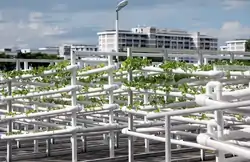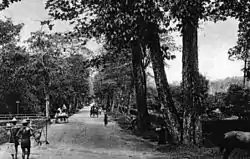Agriculture in Singapore
As a highly urbanised city-state, agriculture in Singapore is a small but growing industry, comprising only about <1% of its total GDP. Nevertheless, the country has made use of biotechnology to make up for the lack of hinterland, such as rooftop and vertical farming. In 2019, Sky Greens, a vertical farm operating in the country, received the world's first urban farm certification for organic vegetables.[1][2][3]



Singapore is ranked 1st on the Global Food Security Index.[4]
History
As Singapore rapidly industrialised after its independence, agriculture in the country greatly reduced in the 1980s. In that decade, there were officially 2,075 farms in the country, covering an area of 2,037 hectares (5,030 acres), an average of less than 1 hectare (2.5 acres) per farm.[5]
Before modernised development, Orchard Road was a stretch of agricultural orchards. As with many other areas, the farms there soon began to disappear, and Singapore became more reliant on overseas imports.[5] One major issue in 1984 was the health concerns with pig farms in Singapore, concerning the pollution of the environment.[5]
Major agricultural products
Food crops
Fruits produced in Singapore include durians, rambutans, and mangosteens,[6] while edible fungus produced in the country include mushrooms.[5] There are also farms in the country responsible for the production of eggs, vegetables, poultry,[7] and pork.[5]
Flower crops
Flowers grown in Singapore are exported to other parts of the world,[6] namely Japan, the United States, Australia, and territories in Western Europe.[5] Such flowers include the orchid.[6] There are 153 orchid farms in Singapore.[5] Plants are mostly cultivated in Singapore for decorative purposes.[5]
Fishing
Fish grown in Singapore are mostly kept as aquarium fish,[6] though some fish farms rear fish as food items.[7] Qian Hu Corporation Limited is a major fishery in Singapore, farming, exporting, and importing some thousand fish species.[8] On 5 June 2020, the Singapore Food Agency announced that domestic Singapore consumers will eventually be able to buy wholesale seafood at a single location at some time in the coming years, with Jurong Fishery Port and Senoko Fishery Port being consolidated by 2023.[9]
Statistics
Singapore produces around 22,458 tonnes of vegetables while its population consumes 524,462 tonnes of them in 2016.[10][11] Farming takes place mostly in the countryside region of Singapore, where the farms are located.[6] About 113.9 hectares of land are allocated for vegetable farming as of 2014.[12] Agriculture in the country is responsible for less than 0.5 percent of the country gross domestic product (GDP), as of 2010.[7]
Food security
The agricultural production in Singapore is not enough to deliver to the needs of the country's people, and as such, about 80 percent of the country's food comes from overseas imports, making food security an important issue.[7] Singapore is ranked 1st on the Global Food Security Index.[4]
In March 2019, the government of Singapore set an aggressive "30 by 30" goal which aims to become 30% self-sufficient in food production by the year 2030. It aims to do this through high-tech vegetable farms (i.e. multi-storey hydroponics farms), and through aquaculture farms. By using multi-storey hydroponics farms, land productivity can be increased and energy and water resource use can be maximised.[13][14]
The COVID-19 pandemic highlighted the vulnerabilities to Singapore's food supply. In 2020, MP Ang Wei Neng suggested that the country should encourage urban farming.[15]
Governance
The Agri-Food & Veterinary Authority (AVA) was the authoritative body in charge of the oversight of agriculture in Singapore.[16] Agricultural imports are habitually reviewed for safety and health,[17] especially during crises such as bird flu outbreaks in other parts of the world.[18] The AVA was absorbed into the Singapore Food Agency (SFA).
See also
References
- S, B (11 June 2019). "Vertical farm receives the world's first urban farm certification for organic vegetables". straitstimes.com. The Straits Times. Retrieved 24 December 2020.
Sky Greens, an urban farm in Lim Chu Kang, has been awarded the world's first national standard for organic vegetables grown in urban environments, developed in Singapore to address key challenges such as limited land, lack of soil and water and higher operating costs from energy consumption and manpower constraints.
- Y, L (15 November 2020). "High-tech vertical farms to begin operations next year and bring fresher leafy greens to Singaporean plates". todayonline.com. Today. Retrieved 24 December 2020.
- L, Y (12 May 2020). "Urban farming will be allowed at rooftops of 9 HDB multi-storey car parks". todayonline.com. Today. Retrieved 24 December 2020.
- "The World's Best Countries For Food Security". worldatlas.com.
- "Singapore - Agriculture". Country Studies. Retrieved June 2, 2013.
- Dana Meachen Rau (2004). Singapore. Marshall Cavendish. pp. 12–. ISBN 9780761417279.
- "Agriculture in Singapore". Commonwealth of Nations. Retrieved June 2, 2013.
- "Qian Hu Corporation Limited". Retrieved June 2, 2013.
- "Singapore fishery ports to be consolidated amid review of fresh food wholesale industry". CNA. Retrieved 2020-06-05.
- "Consumption/ Per Capita Consumption". Agri-Food & Veterinary Authority of Singapore.
- "Local Production". Agri-Food & Veterinary Authority of Singapore.
- "Farming Area". Data.gov.sg. Government of Singapore.
- Singapore sets 30% goal for home-grown food by 2030
- 30 by 30: Boosting food security in land-scarce Singapore
- hermesauto (2020-04-06). "Parliament: Encourage growth of urban farming to secure Singapore's food supplies, says Ang Wei Neng". The Straits Times. Retrieved 2020-04-06.
- "Corporate Identity". Agri-Food and Veterinary Authority of Singapore. Archived from the original on December 6, 2013. Retrieved June 2, 2013.
- "Agri-Food and Veterinary Authority (Processed Food)". Singapore Customs. Archived from the original on May 15, 2013. Retrieved June 2, 2013.
- "Singapore free from bird flu; poultry and poultry imports safe for consumption: AVA". Channel News Asia. April 12, 2013. Archived from the original on April 14, 2013.
